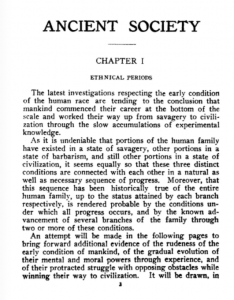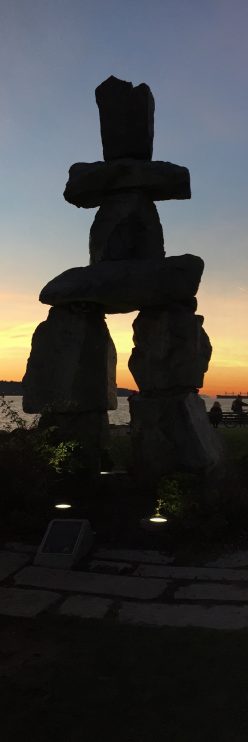Settlement (natural) versus Conflict (unnatural)
Assignment 1.3 (Blog post – Chamberlin – Question #4)
“The sad fact is that the history of settlement around the world is the history of displacing other people from their lands, of discounting their livelihoods and destroying their languages” (Chamberlin 78)
“The history of many of the world’s conflicts is a history of dismissing a different belief or different behaviour as unbelief or misbehaviour, and of discrediting those who believe or behave differently as infidels or savages.” (Chamberlin 78)
Above are two different ways of examining and understanding the history of settlement in Canada. The first way of understanding history “naturalizes” notions of settlement and civilization which was first proposed by Lewis Henry Morgan in, Ancient Society (1877). As described by Morgan, “The remote ancestors of the Aryan nations presumptively passed through an experience similar to that of existing barbarous and savage tribes” (6). For more of the original document, it is available here (digitally that is), the Introduction of Ancient Society by Morgan.

The different way of looking at this way of explaining history, not through settlement but rather through conflict, which is simultaneously occurring for many people. This way of understanding the history of Canada is to attempt to prevent the denial of the Indigenous people’s experiences, stories and voices. By considering that conflict between humans are often as a result of diverse cultural differences (beliefs, behaviours, ceremonies) rather than absolute hierarchical linear evolution from the ‘savage’ to the ‘civilized, it redefines “Them and Us”.
It brings all of us together by considering both sides of the story, the them and the us as part of an interrelated version of historical story. If one attempts to consider history through the exploration of different beliefs rather than in a way that reinforces the colonizers view of the settler versus others, it becomes difficult to see the ‘other’ as being the opposite of ‘us’. Instead one begins to view the pain and suffering of the ‘other’, of Them.
So when exploring history through conflict, the meaning of home becomes much more difficult to isolate. However, I think a recent clip by The Daily Show with Trevor Noah begins to sum up the different stories that arise if one views the oppressed individuals as human beings with a voice that should be heard. Watch the clip from Hasan Minhaj from the Daily Show with Trevor Noah as well as watch some additional footage about the protest.
That clip is available here:
http://uproxx.com/tv/daily-show-pipeline-protest-north-dakota/
I felt this recent clip was relevant as little mainstream media attention is being paid to this story illustrating that the story is still considering the view of the settlers rather than the dislocated (homeless). If we were to consider this through the eyes of conflict rather than what is ‘natural’ perhaps mainstream media would be airing some of the personal stories that would likely be heard if one were to go there and talk to some of the occupiers (aka protestors) but really they are occupying their land with culture, stories, and voices in order to contest the future of the area. All they want to do is protect their home despite what the settlers hope they do which is approve the pipeline which if one looks carefully, it isn’t difficult to see the ongoing colonization (and forced spread of capitalism – oil isn’t shared by all) in the current situation in North Dakota. It is rather disturbing to myself, much like many of the historical stories Chamberlin mentioned in relation to being homesick, homeless and homelessness.
Works Cited
Chamberlin, J. Edward. If This Is Your Land, Where Are Your Stories? Vintage Canada, 2004.
Morgan, Lewis Henry. “Ancient Society.” Internet Archive, archive.org/stream/ancientsociety035004mbp#page/n25/mode/2up. Accessed 17 September 2016.
Roberts, Andrew. “‘The Daily Show’ Lends a Hand to End the Native American Pipeline Protest in North Dakota.” uproxx.com. uproxx.com/tv/daily-show-pipeline-protest-north-dakota/. Accessed 18 September 2016.

Hello Colleen,
I think the main complication lies in the the fact that the stories of these different communities are tied to land. Part of the problem is undoubtedly the physical space that both group wish to claim on. When both communities create and project stories on a shared physical canvas, it’s complex for both narratives to co-exist as they invade one another’s “strangeness” as Chamberlin puts it. Each community’s narrative encourages different usages on the land; a physical impasse that can’t quite be solved merely by seeing both stories. If a compromise were to be made, then the stories of both parties would have to change as well. This is where I’m also stuck as I try my best to look at both sides from an objective lens, what do you think?
Morgan’s colonial views re: savagery and civilization and settlement as a natural progress are not surprising. It reminds me of racial determinism, and how many nations (and the nazis) co-opted Darwinist concepts like survival of the fittest to justify colonization, because the superior nation was destined to conquer the inferior nations to gain supremacy. And of course the superior in this case was anyone who was white, educated, and male. I like your view about considering conflict. It reminds me of Chamberlin’s account of the judge dismissing the woman who wanted to sing in court. As for the “homelessness”, Chamberlin mentions how there are no words to describe the link between First Nations and their homeland. Although the settlers/colonizers were themselves homeless, home didn’t have the same meaning for them. The First Nations’ homelessness was not just physical, especially since the word for home could have many different, significant meanings. I think we place different values on and have different meaning behind “home” and “land”. I’ve been following the Dakota pipeline news, where there are two opposing sides with such different understandings of home and land…How can we come to an understanding or meet on common ground, as Chamberlin says?
Hi Lucas,
I would absolutely agree. I certainly didn’t mean to imply that it would be easy to do given the fact that both parties have stories tied to the land. However, I think you made an interesting point when you said, “then the stories of both parties would have to change” and perhaps that is just it. I don’t know how but something has to change and in my view, it should be the settlers. Someone has to compromise and I think that to be truly postcolonial, North America has to begin to live by the treaties that should have been enacted long ago and recognize the harm that capitalism, theft and oppression have done to those communities. I know that is dreaming but isn’t that a story within itself.
I don’t know what needs to change but perhaps by viewing these situations as conflicts rather than just the rights of the new settlers, we change the story of everyone’s future and therefore, home becomes something more inclusive rather than exclusive.
Hi Marissa,
I was considering including this in the original post and then for some reason decided against it but unfortunately, Darwin was a strong advocate for eugenics. In Darwin’s words,
I honestly have no idea but as I somewhat alluded to in another response was someone has to change and by altering the way in which we explain history, perhaps it is the colonizers who have to change the most. It was the colonizers who have done far more harm to the Indigenous people of North America be it in Canada or the United States. That doesn’t even include the Indigenous throughout Central and South America who were colonized by various countries such as Spain and Portugal. As Chamberlin also discuses the Aborigines from Australia, I think it is safe to say that many Indigenous around the world likely have common ground through their similar experience of colonization despite differing greatly in cultural backgrounds. Perhaps we are considering the choices incorrectly, perhaps we should consider how the stories might come together in ways we never could have predicted such as using social media.
Darwin, Charles. “The Descent of Man.” Readings for a History of Anthropological Theory, edited by Erickson, Paul A., and Liam Murphy, University of Toronto Press Inc., 2013, 54-62.